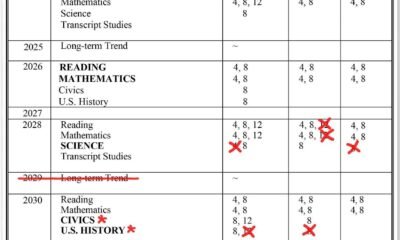Travel Guides & Articles
What to know about Trump’s new travel ban

President Donald Trump has banned travel to the U.S. by citizens of 12 countries and restricted access for those from seven others, citing national security concerns in resurrecting and expanding a hallmark policy from his first term that will mostly affect people from Africa and the Middle East.
The ban announced applies to citizens of Afghanistan, Myanmar, Chad, the Republic of Congo, Equatorial Guinea, Eritrea, Haiti, Iran, Libya, Somalia, Sudan and Yemen. The heightened restrictions apply to people from Burundi, Cuba, Laos, Sierra Leone, Togo, Turkmenistan and Venezuela who are outside the U.S. and don’t hold a valid visa.
The policy took effect Monday and does not have an end date.
Here’s what to know about the new rules:
How Trump justified the ban
Since returning to the White House, Trump has launched a campaign of immigration enforcement that has pushed the limits of executive power and clashed with federal judges trying to restrain him.
The travel ban stems from a Jan. 20 executive order Trump issued requiring the Department of State, Department of Homeland Security and the Director of National Intelligence to compile a report on “hostile attitudes” toward the U.S.
The aim is to “protect its citizens from aliens who intend to commit terrorist attacks, threaten our national security, espouse hateful ideology, or otherwise exploit the immigration laws for malevolent purposes,” the administration said.
In a video posted on social media, Trump tied the new ban to a terrorist attack Sunday in Boulder, Colorado, saying it underscored the dangers posed by some visitors who overstay visas. The man charged in the attack is from Egypt, a country that is not on Trump’s restricted list. U.S. officials say he overstayed a tourist visa.
Who is exempt from the ban
2. Dual citizens, including U.S. citizens who also have citizenship of one of the banned countries
3. Some athletes: athletes and their coaches traveling to the U.S. for the World Cup, Olympics or other major sporting event as determined by the U.S. secretary of state
4. Afghans who worked for the U.S. government or its allies in Afghanistan and are holders of Afghan special immigrant visas
5. Iranians belonging to an ethnic or religious minority who are fleeing prosecution
6. Certain foreign national employees of the U.S. government who have served abroad for at least 15 years, and their spouses and children
7. People who were granted asylum or admitted to the U.S. as refugees before the ban took effect
8. People with U.S. family members who apply for visas in connection to their spouses, children or parents
9. Diplomats and foreign government officials on official visits
10. Those traveling to U.N. headquarters in New York solely on official U.N. business
11. Representatives of international organizations and NATO on official visits in the U.S.
12. Children adopted by U.S. citizens
Which countries are affected
Trump said nationals of countries included in the ban pose “terrorism-related” and “public-safety” risks, as well as risks of overstaying their visas. He also said some of these countries had “deficient” screening and vetting or have historically refused to take back their citizens.
His findings rely extensively on an annual Homeland Security report about tourists, businesspeople and students who overstay U.S. visas and arrive by air or sea, singling out countries with high percentages of nationals who remain after their visas expired.
“We don’t want them,” Trump said.
The inclusion of Afghanistan angered some supporters who have worked to resettle its people. The ban makes exceptions for Afghans on special immigrant visas, who were generally the people who worked most closely with the U.S. government during the two-decade war there.
The list can be changed, the administration said in a document, if authorities in the designated countries make “material improvements” to their own rules and procedures. New countries can be added “as threats emerge around the world.”
State Department guidance
The State Department instructed U.S. embassies and consulates on Friday not to revoke visas previously issued to people from the 12 countries listed in the ban.
In a cable sent to all U.S. diplomatic missions, the department said “no action should be taken for issued visas which have already left the consular section” and that “no visas issued prior to the effective date should be revoked pursuant to this proclamation.”
However, visa applicants from affected countries whose applications have been approved but have not yet received their visas will be denied, according to the cable, which was signed by Secretary of State Marco Rubio.
And, unless an applicant meets narrow criteria for an exemption to the ban, his or her application will be rejected starting on Monday.
How the ban differs from 2017’s
Early in Trump’s first term, he issued an executive order banning travel to the U.S. by citizens of seven predominantly Muslim countries, including Iraq, Syria, Iran, Sudan, Libya, Somalia and Yemen.
It was one of the most chaotic and confusing moments of his young presidency. Travelers from those nations were either barred from getting on flights to the U.S. or detained at U.S. airports after they landed. They included students and faculty, as well as businesspeople, tourists and people visiting friends and family.
The order, often referred to as the “Muslim ban” or the “travel ban,” was retooled amid legal challenges until a version was upheld by the Supreme Court in 2018.
That ban affected various categories of travelers and immigrants from Iran, Somalia, Yemen, Syria and Libya, plus North Koreans and some Venezuelan government officials and their families.
Reactions to Trump’s order
Venezuela President Nicolás Maduro’s government condemned the travel ban, characterizing it in a statement as a “stigmatization and criminalization campaign” against Venezuelans.
Chad President Mahamat Deby Itno said his country would suspend visas for U.S. citizens in response to the ban.
Aid and refugee resettlement groups also denounced it.
“This policy is not about national security — it is about sowing division and vilifying communities that are seeking safety and opportunity in the United States,” said Abby Maxman, president of Oxfam America.
But reactions to the ban ran the gamut from anger to guarded relief and support.
In Haiti, radio stations received a flurry of calls Thursday from angry listeners, including many who said they were Haitians living in the U.S. and who accused Trump of being racist, noting that the people of many of the targeted countries are Black.
Haitian-American Elvanise Louis-Juste, who was at the airport Sunday in Newark, New Jersey, awaiting a flight to her home state of Florida, said many Haitians wanting to come to the U.S. are simply seeking to escape violence and unrest in their country.
“I have family in Haiti, so it’s pretty upsetting to see and hear,” Louis-Juste, 23, said of the travel ban. “I don’t think it’s a good thing. I think it’s very upsetting.”
William Lopez, a 75-year-old property investor who arrived from Cuba in 1967, supports the travel ban.
“These are people that come but don’t want to work, they support the Cuban government, they support communism,” Lopez said at a restaurant near Little Havana in Miami. “What the Trump administration is doing is perfectly good.”
___
Associated Press reporters Evens Sanon in Port-au-Prince, Haiti, and Dánica Coto in San Juan, Puerto Rico, Regina Garcia Cano in Caracas, Venezuela, Steve Karnowski in Minneapolis and Gisela Salomon in Miami contributed.
Travel Guides & Articles
Festive travel packages by Thomas Cook India and SOTC Travel

Traditionally, Indian festivals have been celebrated at home or in ancestral houses, with families gathering under one roof. Recently, Indian consumers have also been choosing to travel and celebrate festivals with multi-generational family units and friends.
Thomas Cook India and SOTC Travel’s India Holiday Report 2025 highlights this shift in consumer behaviour, with demand for longer festive breaks, higher holiday spends and interest in experiences ranging from heritage and luxury stays to cruises and new destinations.
To tap into this growing festival travel trend, Thomas Cook (India) Limited, an omnichannel travel services company, and its Group Company, SOTC Travel, have introduced a specially curated range of holidays for the upcoming festive season, featuring special group tour departures from Kolkata for Durga Puja and Karnataka for Dussehra, as well as from high-potential markets of Gujarat and Maharashtra. In addition, the companies have also announced special Diwali departures across key pan-India markets.
The companies have also announced a special offer: discounts of up to Rs.10000 per transaction across select holidays via HDFC credit cards.
Festive tourism trends
Longer stays and increased spends: From the traditional 3 days Indians are now extending their stays to 6-12 days (multi-generational families combining school vacations like Dussehra, Durga Puja and Diwali). Young India’s millennials/GenZ and working professionals are embracing extended trips, combining weekends with festival holidays for a 5-6 day break
Favourite destinations:
-
Domestic & Indian Subcontinent: Andaman, Kerala, Kashmir, Himachal Pradesh, Rajasthan, Goa, Karnataka, North East, Sri Lanka, Bhutan and Nepal
-
International: Thailand, Singapore with Bintan, Malaysia, Sabah, Indonesia, Vietnam, Oman, Australia-New Zealand, Switzerland, France, Finland, Japan, Georgia, Germany, Spain, Austria, Kenya, South Africa, Dubai, Abu Dhabi, Maldives, Mauritius, South Korea
-
Visa-Free, Visa-on-arrival and easy-visa destinations in demand: Thailand, Malaysia, Philippines, Sri Lanka, Nepal, Bhutan; Dubai-Abu Dhabi, Indonesia, Maldives
- Spiritual Journeys: Leveraging festive sentiment, Thomas Cook and SOTC have curated spiritual journeys through their Spiritual Journeys & Darshans portfolio – featuring Char Dham, Kashi, Ayodhya, Rameswaram, Tirupati, Amritsar, Varanasi, Prayagraj, Dwarka and Sri Lanka with special themed tours such as ‘Ramayan Anant Yatra’ and ‘Ramayan Trails’
- Premium/affordable luxury travel: Customers are opting for luxury resorts and spas, with destinations like France, Switzerland, Scandinavia, South Korea, Japan, Singapore, Australia, New Zealand, Oman, Morocco, Seychelles
- Cruising: Strong interest for sailings across South East Asia and the Middle East (Costa Cruises, Resorts World Cruises); premium sailings like Disney Cruise Line in Australia and Singapore; domestic (Cordelia)
- Festival regional group tours: The companies are witnessing strong interest in their regional tours: Adhbhut Asia, Alokik Asia, Ashadharon Vietnam, Duronto Dubai O Abu Dhabi, Akorshonio France O Swiss with departures accompanied by regional tour managers; on-tour puja and curated vegetarian meals on select tours
Rajeev Kale, President & Country Head, Holidays, MICE, Visa – Thomas Cook (India) Limited said, “Travel has become non-negotiable and festive tourism serves as a cultural driver. We are witnessing a strong and exciting trend—Indians are no longer staying at home but increasingly choosing to celebrate festivals while travelling. This is reiterated in our India Holiday Report 2025 that also reveals a strong shift—85% of Indians are increasing their travel frequency and budgets, driven by a desire to celebrate culture in immersive, meaningful ways.
Hence, to maximise this opportunity we have launched innovative festive regional groups tours like Adhbhut Asia, Alokik Asia, Ashadharon Vietnam, combining local and authentic experiences to meet the aspirations of India’s new-age travellers.”
S.D. Nandakumar, President & Country Head – Holidays and Corporate Tours, SOTC Travel Limited said, “India’s festive calendar is fast emerging as a travel driver. Families and friends are increasingly using these breaks to create multiple holidays rather than a single long annual holiday. Significantly, this trend is not restricted to customers from metro cities, but also from India’s tier 2 and 3 markets, reflecting a strong, nationwide aspiration to travel. Travellers are also embracing new formats—cruise holidays, boutique and heritage stays, luxury villas and immersive experiences like culinary trails and adventure activities. At SOTC, we have designed our festive portfolio to blend celebration with exploration—curating domestic and international tours that allow Indians to experience their festivals in unique settings, while creating deeper connections and lasting memories.”
Travel Guides & Articles
India’s TBO Buys Luxury Tour Operator Classic Vacations

Luxury tour operator Classic Vacations has a new owner.
Gurugram, India-based global travel distribution company TBO has purchased Classic Vacations from its current owner, the Phoenix-based investment firm The Najafi Companies, for “up to $125 million.”
The deal gives Classic its third owner in the last five years; Expedia Group owned Classic before selling it to The Najafi Companies in 2021.
Classic is one of the premier U.S. luxury vacation companies and has always operated under a B2B2C model, with a strong presence in the travel trade. The move from The Najafi Companies to TBO will only enhance that dedication, Melissa Krueger, the CEO of Classic, said in the announcement.
“We’re excited for this next phase in our company’s journey,” said Melissa Krueger, CEO of Classic Vacations. “TBO’s tech-centric solutions are geared fully toward our travel advisor community. TBO connects us to its first-class technology platform—unlike what the wholesale market has ever had access to—allowing us to bring even more resources, tools and insider connections to our valued travel advisors.”
According to the announcement, Classic Vacations delivered a revenue of $111 million and an operating EBITDA of $11.2 million in the fiscal year ended Dec. 31, 2024.
Travel Guides & Articles
Long Weekend 2025: 15 Best Travel Destinations Within 200 km Of Delhi-NCR | News

Famous for its Lathmar Holi, Barsana is a beautiful small town with Radha temples, hills, and rustic charm, perfect for a cultural weekend trip.
Travel Tip: Since these destinations are within driving distance, you can plan short road trips with family or friends. Keep track of upcoming long weekends in 2025 to make the most of these quick escapes!
(All images credit: freepik)
-

 Business6 days ago
Business6 days agoThe Guardian view on Trump and the Fed: independence is no substitute for accountability | Editorial
-
Tools & Platforms3 weeks ago
Building Trust in Military AI Starts with Opening the Black Box – War on the Rocks
-

 Ethics & Policy1 month ago
Ethics & Policy1 month agoSDAIA Supports Saudi Arabia’s Leadership in Shaping Global AI Ethics, Policy, and Research – وكالة الأنباء السعودية
-

 Events & Conferences4 months ago
Events & Conferences4 months agoJourney to 1000 models: Scaling Instagram’s recommendation system
-

 Jobs & Careers2 months ago
Jobs & Careers2 months agoMumbai-based Perplexity Alternative Has 60k+ Users Without Funding
-

 Education2 months ago
Education2 months agoVEX Robotics launches AI-powered classroom robotics system
-

 Funding & Business2 months ago
Funding & Business2 months agoKayak and Expedia race to build AI travel agents that turn social posts into itineraries
-

 Podcasts & Talks2 months ago
Podcasts & Talks2 months agoHappy 4th of July! 🎆 Made with Veo 3 in Gemini
-

 Podcasts & Talks2 months ago
Podcasts & Talks2 months agoOpenAI 🤝 @teamganassi
-

 Education2 months ago
Education2 months agoMacron says UK and France have duty to tackle illegal migration ‘with humanity, solidarity and firmness’ – UK politics live | Politics





















